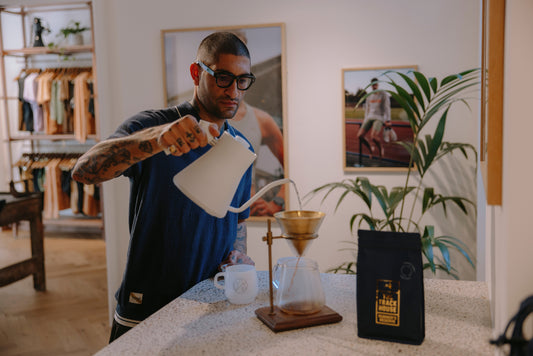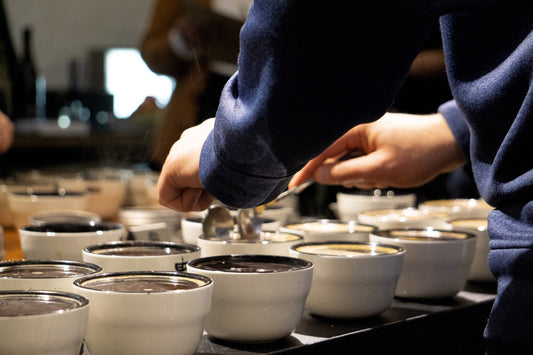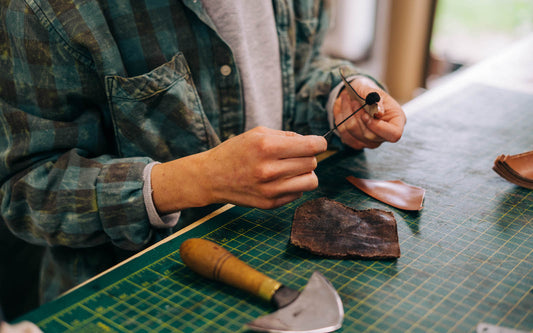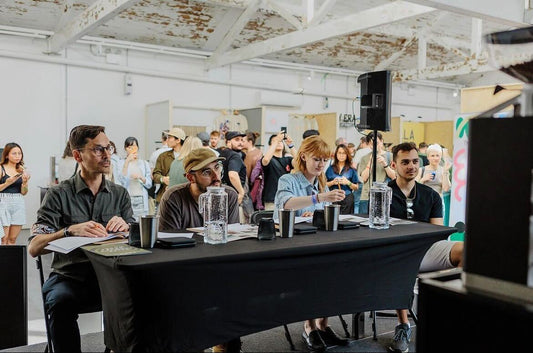Our ‘Love Your Work’ profile series sets out to discover and showcase individuals, organisations and initiatives, all of whom share our commitment to quality.
For the December instalment, we met up with Pump Street Bakery and Chocolate co-founder Joanna Brennan at our Roastery in Bethnal Green. Along with her father, Chris, Joanna opened Pump Street Bakery in the Suffolk coastal town of Orford in 2010, and since then they’ve also added a Chocolate arm to the business.
We discuss how a family interest in trying out new types of bread, and then chocolate, has grown from its remote Suffolk beginnings into a brand with an international presence, what values the Bakery and Chocolate businesses share, and why starting the business in the quiet town of Orford had a whole host of advantages.
Where did it all begin for Pump Street Bakery and Chocolate?
So the bakery came first, and it all really began with better bread being more available. As a family, we were trying bread we hadn’t had access to before – whether it was going to Paris and eating excellent baguettes, or to London and trying the sourdough from St. John Bakery. That really piqued my father and I’s interest – mine from an eating perspective, and his from a making perspective, and so he set out to try and make some of this bread. I was fairly sceptical because I thought this was something you could only do in a professional bakery, but he really set his mind to it and was soon upgrading our home oven and mixer so that he could make better and better bread. Eventually, he got really good at it, and was making far too much bread - more than we could eat ourselves, and even more than we could give away to friends and family.
So my mum encouraged him to sell it at our local country market, which is in Orford on Saturday mornings. He would bake all through the night on Friday and then go to the market the next day with whatever loaf he had decided to make that week, often trying out new recipes. He always sold out, and eventually people were even queuing to get into the town hall before it opened so they could make sure they got their bread. We were watching this going on both in disbelief and excitement, and that was when we thought this could actually become something. So we set about coming up with a plan, whereby I would leave my job as a speech therapist, and my dad would be the baker, and when we found this space in Orford village square, that was when it all solidified and we had to make a decision. It took a long time to renovate the space and build a commercial bakery with all the proper equipment and we opened in November 2010 as a bakery and café. As it is now, but a lot quieter!
The now iconic pink facade and logo of Pump Street Bakery in Orford, Suffolk.
For the first few years we were trying out lots of different things, slowly adding new products to the range, and my dad was hiring a team of bakers so that he could take a step back from the actual baking to work on new product development. At the same, as we’d done with bread previously, we’d started eating better chocolate as a family, finding all sorts of bars wherever we could and learning about the origins and flavour profiles. There was hardly anyone making quality chocolate in the UK at the time and it was very much inline with what we were doing with our bread. We were using a lot of chocolate in our baking, but we weren’t happy with the quality of it, so we thought ‘let’s make our own’, and my dad set about researching how we could go about setting up the chocolate business.
He’s clearly been integral to the founding and ongoing success of Pump Street, but what’s it like working with your father?
It’s great – I’m so glad we did it and I’ve learnt so much from him over the years. He really immersed himself in learning how to bake, mostly through reading, and he approaches things from a very scientific angle, keen to understand how things work so that he can control all the variables and then play with them accordingly.
That’s been really inspiring to witness and it’s a very different approach to mine, so I think we complement each other nicely. I also understand him so much better now than I did before. Knowing someone as a parent is so different to knowing them as a colleague, and it’s a nice side of him to have seen.
A loaf of Pump Street Bakery’s sourdough bread at the bakery in Orford.
We’ve been lucky enough to have worked closely with the Pump Street Chocolate team for the last few years, but for anyone that’s yet to come across you, what do you think makes you different?
I think there are three things about us that are most unique or different to other chocolate makers. The first is that we’re single farm, so similar to Workshop Coffee, our chocolate is always made with beans from one single farm. We never blend beans from different farms because we want the chocolate we make to be representative of its origin and for the flavour and taste to highlight where it came from.
Secondly, we always buy our chocolate directly from the farmers, which is a growing trend within the craft chocolate industry, but it’s still fairly uncommon. Chocolate doesn’t have the many years of established importing and exporting systems behind it that, say, coffee does, so it’s much easier to work directly with the farmers. Companies like us, buying at the (small) scale that we do, haven’t existed for very long at all, so it’s kind of new territory and this allows us to forge these direct relationships. In the past, many farmers would have sold their chocolate to their national cocoa board, and so often we’re only the second or third customer they’ve ever had a direct relationship with.

These relationships are so central to us making better chocolate. After all, the chocolate depends on the beans, and the beans come from the farm, so the more we can help the farmer to grow the best beans possible, the better the end product will be. As I know Workshop Coffee do with the farmers they source their beans from, we have this ongoing feedback loop with our farmers whereby we’re able to feedback to them with a view to improving the final product.
The final thing that makes us different is the heritage of our bakery. Most of our bestselling chocolate bars are our bakery bars – our sourdough and sea salt bar, for example – and we couldn’t create that type of bar without the knowledge and experience we’ve gleaned from years of running a bakery. It works the other way around too, as we use our chocolate in our baked goods. It’s a natural fit; pastry, bread and chocolate, they taste amazing together. It also means we’re closing the loop of usage of our products in that if we have leftover bread in our bakery, we can make it into breadcrumbs and put it in our chocolate, and so that eliminates waste which is always good.
A Melanger grinding and conching the cocoa nibs into liquid chocolate at the Pump Street Chocolate factory.
You mentioned that your bakery bars are some of your most popular, do you feel like you’ve created your own chocolate sub-genre there?
There are some other chocolate makers doing that with chocolate, but the main difference is they’re not bakeries themselves. Because we’re doing everything, making both the bread and chocolate elements, we’re a closed loop and we’re in complete control of the whole process.
The panettone bar, which we’ve just launched this Christmas, is a great example of the two sides of the business working together. We didn’t just put a panettone into the chocolate, we actually had to bake the panettone without the orange and raisins in the bread, so we had just the crumb and the flavour from the crumb, and then we put that into the chocolate. We then added the orange separately, and finally, added the almonds and sugar crystals to the top of the bar. We wanted to recreate the panettone in the bar which we think works far better than taking the straight forward approach. It’s great when the two businesses can work together on projects like that.
What does ‘quality’ mean to you?
For us, quality means being as close to the best as we can. That’s what we’re always aiming for, not just to be within the good quality range, but to be up there with the best. And that means quality of flavour, but also quality of interaction and quality of service. For example, if you come to the bakery in Orford, you should feel like you’re buying the best sourdough you possibly can, but you should also get enjoyment out of the whole experience and the interaction with our staff and the brand.
A nice example of what quality means to us is that all of our bread each day is baked in the same batch, whether it’s for our bakery or our wholesale customers, and we only deliver within a fifteen mile radius. We could theoretically deliver to London, but the quality of service wouldn’t be as good and it’s just not sustainable to be transporting bread a hundred miles. We deliver bread to places where we’re the local bakery, and if it’s too far away, then we want there to be other local bakeries like us.
Bars of Pump Street Chocolate ready for packaging.
And how do you set that level of expectation amongst your growing team?Primarily, by example.
A lot of the time we’ll reject things, both with our bread and chocolate. As a whole pastry team, we’ll look at the pastries each morning and decide if any aren’t good enough, and if they’re not, they won’t go to the bakery or to our wholesale customers. It’s not the way most businesses work, and it can be really hard to tell our wholesale customers that they’re not going to get any almond croissants today because we’re not totally happy with them. Initially, that wasn’t something they were used to and they were obviously disappointed, but now I think they understand that we have to do that so that when they do receive them (which is the majority of the time), they’re the best they can possibly be.
Another thing which I think is really important for the culture of the business is that criticism or analysis of what we’re doing musn’t be seen as a negative thing, but as a necessity if we’re to do the best we can.
You recently opened a pop-up shop on Redchurch Street in Shoreditch for a week. Was that born out of necessity, a presence in a big city being a requirement for a growing brand?
I wouldn’t say it’s necessary as such, and you can definitely do a lot without a physical space in a city, but it’s been incredibly useful and a great learning experience for both me and for us as a company. It’s nice to be able to offer an experience to customers who know of us, and have perhaps visited the bakery once, but who can’t make it out to Suffolk on a regular basis.
Above all, it’s a great way to stay in touch with your customers, to actually meet them and chat with them, and to get feedback on your products. It also helps me to measure where we are now, and where we might want to go in the future.
Baked goods and chocolate side-by-side at Pump Street’s pop-up on Redchurch Street, London this November.
Conversely, do you think there have been any benefits to starting what is now a global business in a relatively remote, Suffolk coastal town?
Definitely, and more than I’m probably aware of.
One of the main benefits is having the support of a local community and I think that would be much harder to achieve in a large city. It took a bit of time to gain that trust, but once people realised what we were trying to do they really got behind us. I’m always amazed when people send me photos of our chocolate bars on sale in far flung places. To me, it seems like they’re proud and happy to see us doing well, and that’s fantastic.
Secondly, we’re creating opportunities in an area where job creation obviously isn’t what it is in London. That works both ways though - on the one hand, it’s amazing to be able to offer a whole new set of jobs in an area that previously didn’t have that kind of business, but on the other hand Orford is very remote, and that creates logistical challenges.
Starting the business in Suffolk also gave us the time to take things slowly. I think in London, such are the overheads and the pace of things, that your business needs to be standing on its own two feet within three months, whereas we were able to move at our own pace and I think that’s only been to our benefit.
Which other businesses or industries do you look to for inspiration and ideas
Coffee has been a great role model for us actually. The specialist coffee movement, with its smaller scale roasteries and sourcing more directly from origin, is years ahead of where chocolate is, but there are definitely comparisons to be drawn there. Looking at different business models and learning how certain companies expanded has been really useful.
Otherwise, I think we take a lot of inspiration from art and design. My husband is an interior designer so I talk to him about his work and we talk a lot about the bakery. He works mainly in the luxury market so that gives us an understanding of what’s happening there. It’s all useful.
I think as a small business owner there are lessons to be learned everywhere, you’ve just got to keep your eyes open.
Where would you like to see the Pump Street brand ten years from now?
I’d love us to have a wider range of products. It’s something we’re constantly working on, but it takes a huge amount of time and energy to develop and then launch new products. One thing we’re working on at the moment is to make it easier for people to try our whole range of chocolate. We currently sell a ‘Library of Bars’, but at £60 it’s quite an investment and we’d like to lower that threshold. That’s all I can really say about it for now...
It would be great to do more fun, seasonal things, too. People want to buy chocolate for a special event and we don’t currently offer many products like that.
I also just want us to still be doing what we’re doing now, and not to have changed too much.
And finally, first there was the bakery, then the chocolate, what’s next for Pump Street?
Aha! I don’t think there will be another Pump Street category. We really love doing collaborations with other like-minded producers, like we did with Workshop and the Coffee and Chocolate Bar, so we’ll definitely do more of those. With those collaborations, obviously flavour is of primary importance, but we also want to work with people who have a similar approach to us in some way, and shed light on an industry or origin that’s interesting for people to learn about.
Our third collaborative Coffee and Chocolate bar brings together coffee and cacao both from Ecuador. Together, they create a chocolate that’s perfectly balanced, offering complementary flavours of toasted nuts, brown butter and ginger cake with subtle hints of white grape.
You can view more of our Pump Street Chocolate range here.
Share:













